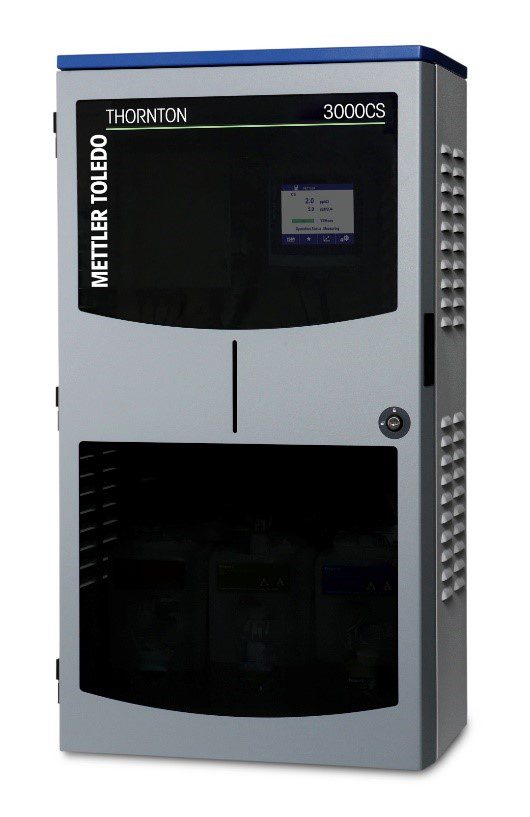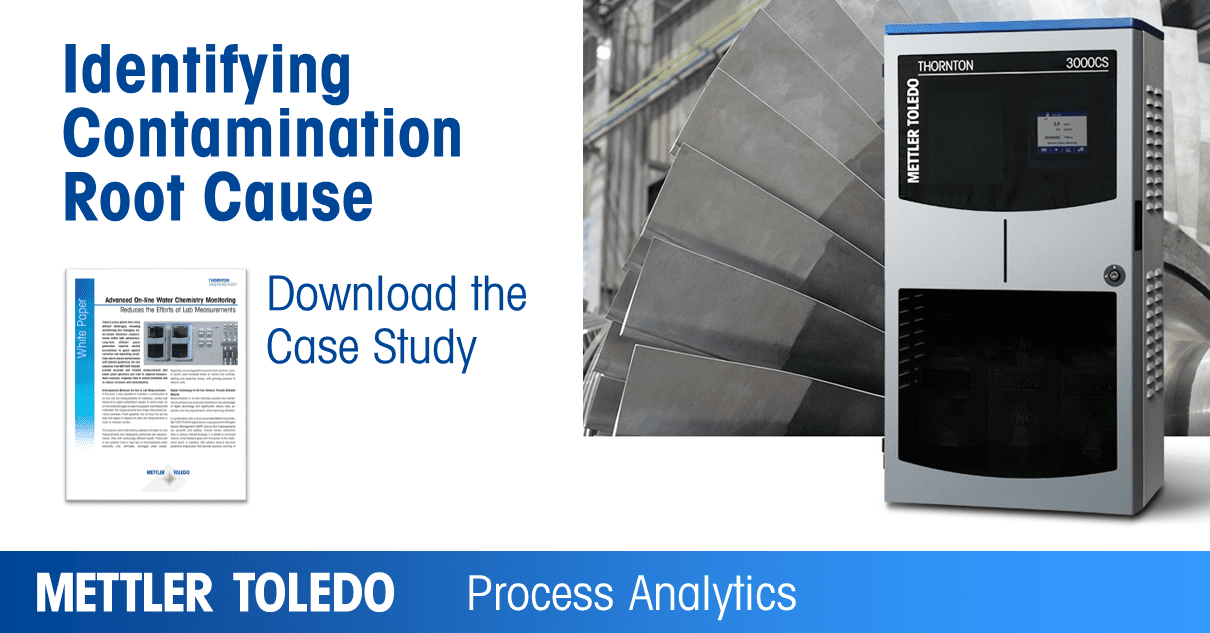Corrosion Prevention with On-line Chloride and Sulfate Monitoring

Chloride and sulfate are highly corrosive ions when present in the water/steam cycle of a power plant. They can damage critical components such as turbines, boilers and steam generator tubes, which can lead to unplanned shutdowns and reduced power generation efficiency.
METTLER TOLEDO Thorntonʼs 3000CS Chloride/Sulfate Analyzer is an accurate and reliable, online analyzer for the direct measurement of chloride and sulfate in pure and ultrapure water. It measures these highly corrosive ions in real-time to prevent damage to critical power plant components.
The International Association for the Properties of Water and Steam (IAPWS) specifies a limit of 2 ppb for chloride and sulfate in steam intended for turbine operation; however, demonstrating compliance with these limits is a challenge for many power plants. Many techniques for measuring ppb-level chloride and sulfate in water are expensive, challenging to operate and maintain, or lack the required sensitivity.
Historically, power plants have used conductivity after cation exchange (CACE) measurements to indicate corrosion levels. CACE analyzers are relatively simple to operate and require little maintenance; however, they lack ion specificity and cannot provide data that is specific to the concentration of chloride or sulfate in the water. This creates a risk to the health of the water/steam cycle as chloride and sulfate concentrations could rise well-above the specified limits before a significant conductivity change is measured. Furthermore, general conductivity measurements are susceptible to interferences from other ions, including organic ions, which are far less corrosive than inorganic ions such as chloride and sulfate. Plants which use amines and organic reducing agents for corrosion control are particularly susceptible to these interference effects. These compounds decompose to produce organic ions which significantly raise conductivity levels and mask changes in chloride and sulfate concentrations.
Consequences of increased chlorides and sulfates:
- Increased corrosion to power plant components
- Increased operator time spent on corrective actions
- Unplanned shutdowns due to corrosive damage
- Additional disruption to customer production in the case of cogeneration plants
As mentioned, typical methods for measuring trace levels of chloride and sulfate are often time-consuming, labor-intensive, offline, expensive or lack the required sensitivity. Conversely, the 3000CS uses a technique known as Microfluidic Capillary Electrophoresis (MCE) which allows ion-specific measurements to be made at ppb-level concentrations.
Microfluidic Capillary Electrophoresis
The 3000CS Analyzer uses sophisticated MCE technology to provide a convenient, dependable method for trace-level chloride and sulfate monitoring. The 3000CS has been developed specifically for online, unattended operation.
This technology allows ions to be separated, based on their relative mobilities, through a small capillary. Ions reach a conductivity detector at different, yet very specific times, allowing for unequivocal identification of each ion. The quality of the separation allows the detector to quantify each ion at very low concentrations and the design of the technology allows those measurements to be made in real-time.
To learn more about the METTLER TOLEDO Thornton 3000CS Analyzer and MCE technology, watch the video below.
Benefits of the 3000CS:
- Accurate online measurements provide real-time monitoring for better corrosion control
- High sensitivity to measure single-digit ppb-level chloride and sulfate allows plants to take corrective action sooner when an excursion occurs
- Avoid unplanned downtime as a result of corrosion or deposits on critical equipment
- Minimal maintenance requirements maximize analyzer uptime and reduce operator hands-on time
- Versatility to measure low-level chloride and sulfate in a number of critical water/steam cycle locations including steam condensate, boiler feedwater and makeup water
Discover more about online chloride and sulfate monitoring in our case study:

METTLER TOLEDO Thornton’s online analytics provide accurate and reliable measurements that power plant operators can trust, while utilizing innovative new technology that reduces risk and increases efficiency. Thanks to advanced online measurement instrumentation, power plants can maintain high power generation efficiency with minimal unplanned downtime.
